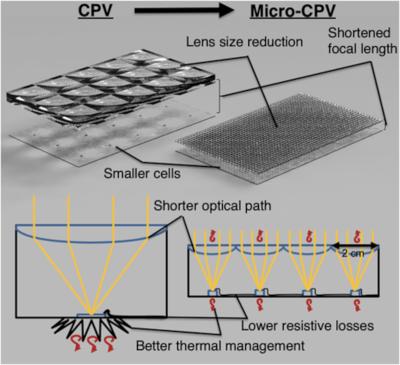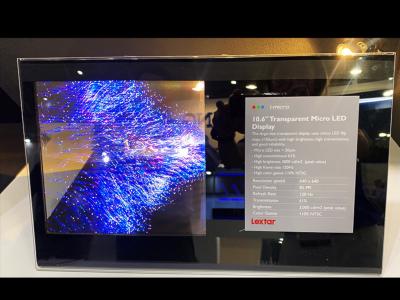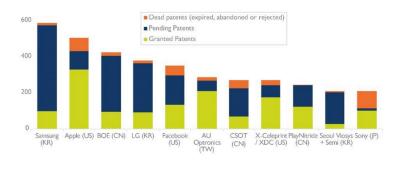 X Display Corporation (XDC) was spun-off from Ireland-based X-Celeprint to commercialize its patented Micro-Transfer-Printing (μTP) technology for the MicroLED display market.
X Display Corporation (XDC) was spun-off from Ireland-based X-Celeprint to commercialize its patented Micro-Transfer-Printing (μTP) technology for the MicroLED display market.
XDC's technology is based on elastomer stamp transfer printing and microIC backplanes. As of early 2020, XDC owns and has rights to over 400 worldwide microLED display patents.
In early 2020 XDC finalized its Series A investment round, led by Daktronics. In October 2020 XDC and Lextar entered into development, licensing and services agreements.
Research Triangle Park,
Durham, NC 27709
United States
An interview with Justin Brown - X Display's Executive Vice President Operations & Equipment
Justin Brown is X Display's Executive Vice President for Operations & Equipment. Justin leads the company’s supply chain development, manufacturing partner relationships and also its Equipment division, which provides mass-transfer equipment for XDC’s partners and licensees. Justin was kind enough to answer a few questions we had for XDC.
Q: Hello Justin, thanks for your time. XDC has been a bit quiet in the last few years. Can you bring us up to date on your microLED technologies, processes and products?
Thank you for the opportunity to share the progress at XDC. We have been busier in the near past than ever before. As you know, we first announced our MicroIC technology, our mass transfer process, our manufacturing equipment and the uniqueness of our approach, the IP strength we possess and the experience of the team. This led to broad customer visibility and we narrowed down our efforts to a select set of partners that we are currently working with. We have deep engagements with customers that we anticipate will result in end product announcements in the future.
Micro-CPV: a promising new solar technology that may benefit from microLED production processes
Researchers from the Universidad Politécnica de Madrid and MIT, published a review article on Micro-Scale Concentrating Photovoltaics, or micro-CPV, a new technology that uses miniaturized solar panels and optics that concentrate the sun's energy into these micro panels. The benefits of micro-CPV compared to normal solar panels include potentially lower cost (much less solar absorption area), better thermal management, shorter optical path and lower resistive losses.
There are many challenges yet before micro-CPVs can be produced in large volume and at competitive prices. Interestingly, microLED production processes can be applied to the production of micro-CPVs, as these solutions can be seen like inverted technologies - tiny devices that either absorb or emit light.
Here are more details on Lextar's 10.6-inch transparent microLED display prototype
Last week we reported that Ennostar Incorporation (formed by a merger of Taiwan's Epistar and Lextar in 2020) demonstrated a 10.6" transparent microLED display at Touch Taiwan 2021. We now have more information on Lextar's new display prototype.
Yole Developpement says rate of MicroLED patent submission is rising sharply
XDC installs the world's first 300mm elastomer stamp based microLED transfer tool
MicroLED display technology developer X Display Company (XDC) announced that it installed the world's first 300 mm elastomer stamp based mass MicroLED transfer equipment late in 2020. This tool was installed in the US and the company hopes to start shipping several similar tools for its customers later in 2021.
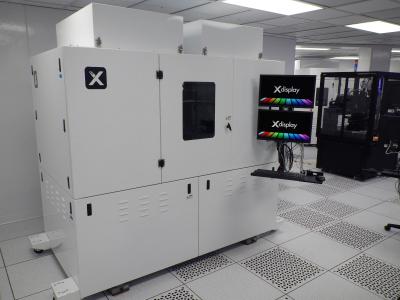
XDC spun out of X-celeprint in 2019 and retained the equipment organization from that transaction. XDC has over 15 years of experience with mass transfer micro printing technologies, and is offering a range of tools for microLED transfer, suitable for R&D work and industrial-scale production.
XDC and Lextar entered into development, licensing and services agreements
LED developer Lextar and microLED display developer X Display Company (XDC) announced that the two companies entered into a development, licensing and services agreements. Lextar licensed XDC's IP and Lextar will supply its high-performance microLED chips to XDC's customers.
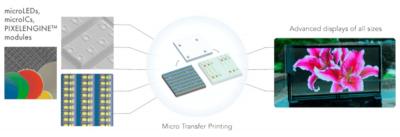
Lextar says that this agreement will accelerate the commercialization of next-generation microLED displays, and its customers can now benefit from a one-stop service, from microLED chips to display modules.

